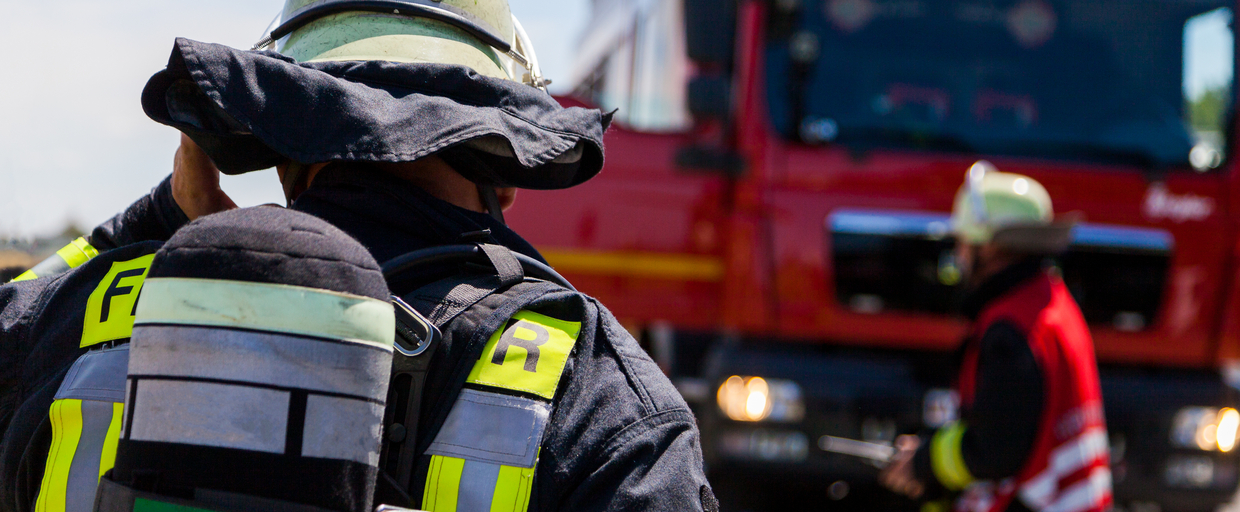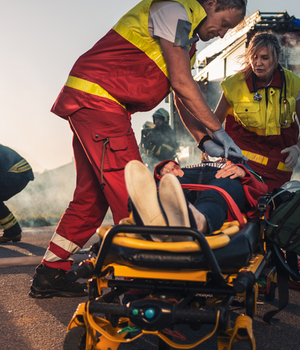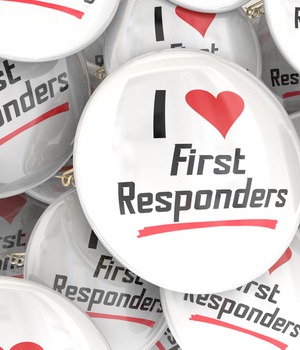Reading Time: 12 minutes

They see more trauma than most. They’re the first on the scene when tragedy happens. First responders experience intense situations, sometimes on a daily basis. These experiences can take a serious toll, making access to first responder mental health resources a vital necessity.
Depression, post-traumatic stress disorder (PTSD), substance use disorder (SUD), suicidal ideation, and domestic violence are all more common among first responders when compared to the general population. For example, more than 50% of firefighters are at risk for PTSD, depression, anxiety, and/or alcohol use disorder.2
First Responder Mental Health Statistics
Keep reading to learn more about the importance of offering resources that support first responder mental health.
of first responders have experienced mental health issues.
of first responders develop behavioral health conditions such as depression.
of police officers experience PTSD.
of 911 operators and dispatchers experience PTSD.
Substance Abuse and First Responders
- 40% of EMTs engage in high-risk use of alcohol or drugs.1
- An estimated 10% of all firefighters abuse drugs.1
- An estimated 29% of all firefighters abuse alcohol.1
Domestic Violence Among First Responders
- 40% of families of police officers have experienced domestic violence, compared to 10% of the general population.3
- Of all occupations, police officers experience the highest rate of domestic violence in their homes.3
First Responder Suicide Statistics
- As many as 37% of fire and EMS first responders have considered suicide, which is 10x higher than the national average.7
- Between 125 and 300 police officers commit suicide every year.7
Barriers to First Responder Mental Health Resources
 Despite the prevalence of mental health disorders among first responders, many people in these professions don’t get the help they need.
Despite the prevalence of mental health disorders among first responders, many people in these professions don’t get the help they need.
In fact, fewer than 50% of first responders who are in need of mental health services take the initiative to seek out those services.4 This isn’t because resources aren’t available; it’s due to other treatment barriers.
For example:
- First responder culture values self-sufficiency, self-reliance, heroic roles, and saving others at risk to self.
- First responders are often unaware of the mental health risks and long-term effects of job-related stress that are present in their careers.
- There is a lack of knowledge about how and where to access services for first responder mental health.
- There are practical barriers associated with time constraints due to shift work and on-call duties.
- First responders fear negative professional consequences, loss of promotion potential, and/or pay if they get treatment.
57% of first responders fear they will experience negative repercussions at work or among their peers if they choose to seek professional help.
40% of first responders admit to being afraid of being demoted or fired if they admit they need professional help in order to deal with work-related mental health issues.
Several steps can be taken to remove some of these barriers.
- The first is to educate first responders and their families about mental health issues and the relationship between substance abuse and first responders. Understanding the causes, prevalence, and treatment surrounding these issues can help remove the stigma associated with mental health disorders and their treatment.
- Second, time constraints can be lessened with more flexible, shorter shifts that allow first responders to access mental health services.
- Third, first responders must be made aware of the many resources available that offer the support they need.
Early Signs of First Responder Mental Health Issues
As a first responder, it’s crucial to watch for early signs of mental health problems in yourself and in your fellow first responders. Following are some of the top red flags that you or someone else is starting to suffer from mental health issues and need to seek out first responder mental health resources.
- Irritability/anger – Do you frequently snap at friends or loved ones? Are things getting under your skin that never used to bother you? A short fuse is a sign of mental health problems.
- Anxiety/depression/constant sadness – Is it difficult to feel joy or pleasure? Do the bad days outweigh the good days? If so, it’s time to reach out for support.
- Reliving traumatic events – Are you experiencing sudden flashes of troubling memories? Do you replay traumatic events in your mind again and again? These are signs of PTSD, which is treatable.
- New or increased substance use – Are you using alcohol or drugs more often? Have you started using substances that you never did previously? These are signs that you’re trying to self-medicate with substances, which can lead to negative consequences and addiction.
- Burnout: Are you experiencing headaches, fatigue, muscle tension, nightmares, digestive problems, or poor self-care? These are symptoms of burnout, which can create problems with mental health, physical health, and substance abuse.6
Promoting a Mentally Healthy Workplace for First Responders
 Offer mental health awareness training: Providing this training equips first responders to recognize when someone needs mental health support, to respond appropriately, and to facilitate getting help for themselves or others.
Offer mental health awareness training: Providing this training equips first responders to recognize when someone needs mental health support, to respond appropriately, and to facilitate getting help for themselves or others.- Establish mental-health-friendly policies: These might include sick leave for mental health reasons, use of leave time for therapy appointments, more frequent breaks based on individual needs rather than a fixed schedule, and permitting food and beverages at work to mitigate the side effects of medications.
- Provide employee assistance programs: These programs support employees’ physical and mental health. Elements of these programs can include fitness programs, incentivized yearly wellness checks, stress management training, anti-stigma campaigns, and work environments that connect with the outside world through natural light and plants.
- Offer resiliency check-ins: These are discussions about how employees are feeling and how they are managing stress and self-care. This is also an opportunity for employees to discuss any additional support they need.
- Create peer-support programs: Involve team members with varied backgrounds and ranks. Often, first responders are more likely to talk to one of their peers who has been through what they are experiencing.
- Make sleep a priority: Create shift schedules that encourage employees to get ample rest. Educate employees about sleep, and complete annual screenings for sleep disorders.
- Follow the Asher Model: This is a seven-point model to help employers in creating a healthy culture of awareness in first responder settings.5
First Responder Mental Health Counseling and Therapy Resources
- Trauma-informed therapy: These types of treatment can be effective in helping improve or eliminate symptoms of PTSD. Methods include Cognitive Behavioral Therapy (CBT), eye movement desensitization and reprocessing (EMDR), and narrative therapy.
- Alternative therapies: These methods may include adventure therapy, equine therapy, yoga, art therapies, or tai chi. These therapies allow first responders to tap into their creative and physical sides to heal from their mental health issues.
- 12-step Groups/Peer Support for First Responders: This treatment offers peer support that creates a sense of accountability and community. First responders have the opportunity to share experiences with others who have similar struggles.
- Intensive outpatient programs: These programs offer aggressive intervention for first responder mental health as well as issues with substance abuse and first responders. IOPs allow clinicians to work with first responders daily while the responder lives at home and maintains family obligations.
List of Substance Abuse and First Responder Mental Health Resources
Many foundations, non-profits, and professional organizations have developed support resources for the first responder community. Following are 55 of the top resources available for first responders at risk, along with those looking for ways to help them.
Non-Profit Organizations and Family Resources for First Responders
- Bulletproof: This resource offers law enforcement professionals and their families confidential resources for mental health, addiction, and treatment.
- For the Frontlines: A non-profit offering free counseling for first responders via text. Available 24/7. First responders can text 741741 to get help with anxiety, isolation, stress, fear, and other issues.
- Livengrin Foundation: Nonprofit offering First Responders Addiction Treatment (FRAT), specializing in treatment and recovery services for first responders and their families.
- National Volunteer Fire Council (NVFC) First Responder Helpline: This helpline is for members of the NVFC and their families. Callers can get up to five free counseling sessions as well as treatment referrals.
- Rosecrance Florian Program: Specialized substance abuse and mental health program for first responders, provided by first responders.
- Substance Abuse and Mental Health Services Administration: SAMHSA offers information on mental health and addiction services and resources.
- Yoga For First Responders: YFFR offers yoga training and classes on stress management. The organization also trains first responders to become yoga instructors.
Support Groups and Organizations for First Responders
- American Academy of Experts in Traumatic Stress: Provides a schedule of online support groups for emergency responders.
- Behavioral Health – First Responder Center for Excellence: Offers articles, the latest policies, and videos to help first responders recognize behavioral health issues and take action.
- COVID-19 – Frontline Workers, Mental Health America (MHA): Site offering virtual mental health screenings and information on how first responders can address anxiety and stress to prevent burnout.
- Crisis Support Resources for Emergency Responders, Disaster Responder Assets Network (DRAN): A one-stop shop for first responders to find information and resources for mental health support.
- Firefighter Behavioral Health Alliance: Organization focusing on behavioral health awareness and suicide prevention. Offers workshops for fire departments, dispatch, and EMS.
- Fire Hero Families: Offers virtual support groups for firefighters and their families to connect anywhere in the country.
- First Responder Support Network: Network of volunteers who offer intensive treatment and aftercare for first responders and their families.
- Frontline Professionals, National Alliance on Mental Illness (NAMI): Offers resources and tools designed specifically for first responders and their family members.
- Project Healing Heroes: Offers support to help first responders overcome traumatic events and PTSD.
- ResponderStrong: Offers professional assistance, self-help tools, educational resources, articles, and a helpline for first responders.
- Reviving Responders: Nonprofit dedicated to promoting EMS mental health and suicide prevention.
- Share the Load Program: Provides resources to help those seeking support for behavioral health issues and help fire and rescue departments implement behavioral health programs.
- Survive First: Offers resources for first responders and their families who are seeking support to navigate mental health challenges.
- The Code Green Campaign: Mental health advocacy and education organization focused on first responders. Also called Code Green, the organization serves all types of first responders.
- Wings of Change: Peer support groups for first responders, led by first responders, offering in-person and virtual meetings.
Crisis Lines for First Responders
- Copline: 800-267-5463. Available 24/7 for law enforcement. Answered by retired officers who have been trained to provide support for officers and their families.
- Crisis Text Line: First responders can text BADGE to 741741 for counseling support for mental health crises. Available 24/7.
- Frontline Helpline: 866-676-7500. Former responders offer support to first responders and their family members who are struggling with trauma.
- Hero’s Warm Line: 844-833-HERO. Available for first responders, their families, and their friends. Offers resources and confidential peer-support services.
- National Suicide Prevention Hotline: Call 988. Available 24/7 for any first responders in crisis, to be connected to a counselor and find support.
- SAMHSA Disaster Distress Helpline: Call or text 800-985-5990. Offers help with emotional distress related to disasters. Available 24/7.
Guides and Articles for First Responders
- Effects of Trauma on First Responders: A series of articles in The Dialogue, a publication from SAMHSA.
- First Responders and Mental Health: Discussion of improving the perception of mental healthcare and mental illness among first responders.
- First Responders and Mental Health – When Heroes Need Rescuing: Focuses on the exposure and effects first responders experience as they protect the population’s health.
- National Data Shows Firefighters’ Mental, Emotional Health Not Getting Enough Attention: Results from a survey of nearly 7,000 firefighters regarding mental and behavioral health.
- Recognizing, Treating, and Managing Post-Traumatic Stress Disorder in First Responders: A look at how the profession of first responders can lead to long-term mental health impacts. Discusses efforts for improving the industry’s response to PTSD in this workforce.
- The Shift Length Experiment – What We Know About 8-, 10- and 12-Hour Shifts in Policing: A study that examines the effects of shift schedules on the health, quality of life, and safety of law enforcement officers.
- Ruderman White Paper on Mental Health and Suicide of First Responders: Comprehensive study of the impact of mental health issues and suicide on first responders.
- Suicide Surveillance, Prevention, and Intervention Measures for the US Fire Service: White paper from the National Fallen Firefighters Foundation that offers findings and recommendations regarding suicide and depression among firefighters.
- Who Takes Care of the Caregivers? Concerns about the mental health of EMS professionals prompt grassroots campaigns to offer support
- Why Our First Responders Are So Burned Out: Discusses how first responders’ jobs affect their mental health, including compassion fatigue.
Books About Mental Health in First Responders
- Copshock – Surviving Post Traumatic Stress Disorder: By Allen R. Kates; Prepares police officers for the effects of trauma and helps families understand the effects of PTSD on their loved ones.
- Emotional Survival for Law Enforcement – A Guide for Officers and Their Families By Kevin M. Gilmartin; Addresses the dynamics that affect the personal and professional lives of police officers.
- First Responder Resilience: Caring for Public Servants: By Tania Glenn; Offers guidance for first responders experiencing burnout, PTSD, and other mental health concerns.
- I Love a Fire Fighter – What the Family Needs to Know: By Ellen Kirschman; Psychologist Kirschman shares advice and strategies for firefighters and their families when they face the occupational hazards of fighting fires, such as trauma and substance abuse issues.
- Relentless Courage – Winning the Battle Against Frontline Trauma: By Shauna Springer; Reveals the mental health toll of the trauma experienced by first responders and describes approaches to healing.
- Surviving the Shadows – A Journey of Hope into Post-Traumatic Stress: By Bob Delaney with Dave Scheiber; Offers therapy ideas and discussion about helping law enforcement officers and soldiers to cope with and overcome the difficulties of PTSD.
- Treating PTSD in First Responders: A Guide for Serving Those Who Serve: By Richard A. Bryant; Looks at PTSD in first responders and the factors that contribute to it.
Mental Health Apps for First Responders
- Calm: Provides assistance with meditation, relaxation, and sleep, to improve emotional health.
- Headspace: Features tools for better sleep, tension-releasing workouts, and mindfulness exercises.
- Heroes Health Initiative: Tool for first responders to track their mental health and access mental health resources.
- Mindfulness Coach: Offers mindfulness practices and tips for lowering stress and promoting relaxation.
- Mindshift CBT: Provides science-based strategies for relaxation, mindfulness, and managing anxiety.
- PTSD Coach: Offers tools for tracking PTSD symptoms, strategies for coping, and access to support.
Resources for Family Members of First Responders
- Fire/EMS Helpline: 1-888-731-FIRE. A confidential, 24-hour helpline designed to meet the needs of firefighters, EMTs, rescue personnel, and their families.
- Safe Call Now: 206-459-3020. A 24-hour confidential crisis line for all public safety employees, emergency services personnel, and their family members nationwide.
- Strategies to Manage Challenges for EMS Families: Offers information about the challenges EMS families face and how to manage those challenges.
- Supporting Officer Safety Through Family Wellness – Helping Your Child Understand Your Job: Created by the International Association of Chiefs of Police, this resource offers insights into anxiety in first responder children and helps law enforcement officers answer questions their children may have.
Resources
- First Responder Mental Health and Wellness. (2021, November 15). Kaiser Permanente. https://business.kaiserpermanente.org/insights/mental-health-workplace/first-responder-support
- Wright, H. M., Fuessel-Hermann, D., Pazdera, M., Lee, S., Ridge, B., Kim, J. U., Konopacki, K., Hilton, L., Greensides, M., Langenecker, S. A., & Smith, A. J. (2022). Preventative care in first responder mental health: Focusing on access and utilization via stepped telehealth care. Frontiers in Health Services, 2, 848138. https://doi.org/10.3389/frhs.2022.848138
- Gottlieb, M. A. (2016, July 20). What profession has the highest rate of domestic violence? Michael A. Gottlieb, P.A. https://www.browardcriminallawyer.com/blog/2016/07/what-profession-has-the-highest-rate-of-domestic-violence/
- Wright, H. M., Fuessel-Hermann, D., Pazdera, M., Lee, S., Ridge, B., Kim, J. U., Konopacki, K., Hilton, L., Greensides, M., Langenecker, S. A., & Smith, A. J. (2022). Preventative care in first responder mental health: Focusing on access and utilization via stepped telehealth care. Frontiers in Health Services, 2, 848138. https://doi.org/10.3389/frhs.2022.848138
- Kreider, N. (2021, June 2). Creating a culture of wellness for first responders. First Responder Wellness. https://www.firstresponder-wellness.com/creating-a-culture-of-wellness-is-critical-in-the-first-responder-workplace/
- Documenting the Traumas of First Responders. (2021, March 12). NAMI: National Alliance on Mental Illness. https://www.nami.org/Blogs/NAMI-Frontline-Wellness/2021/Documenting-the-Traumas-of-First-Responders
- Luster, R. (2022, September 9). First responders and mental health: When heroes need rescuing. Psychiatric Times. https://www.psychiatrictimes.com/view/first-responders-and-mental-health-when-heroes-need-rescuing

 Offer mental health awareness training:
Offer mental health awareness training:
